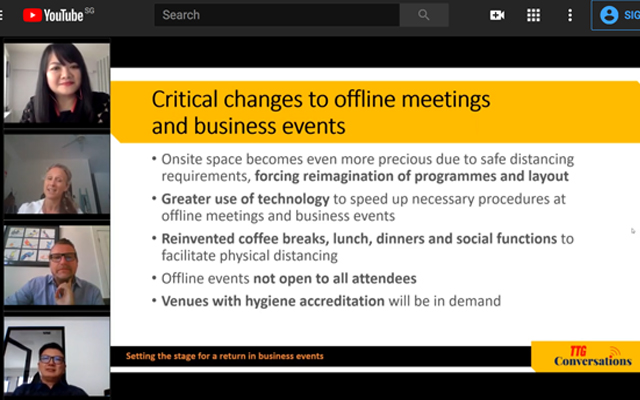Event organisers looking to resume physical meetings in the Covid-19 landscape will need to deliver heightened duty of care for attendees, partners and staff, which will impact how venues and other suppliers are chosen and how events are executed.
These projections and more were discussed during the hour-long TTG Conversations: Setting the stage for a return in business events webinar on May 21. It featured panellists Ian Cummings, global vice president, commercial, CWT Meetings & Events; Kerry Healy, vice president sales Asia Pacific, Accor; and Vincent Yap, director, integrated marketing solutions, Pico Art International, with Karen Yue, group editor of TTG Asia Media as moderator.

Cummings stated that the safety and well-being of attendees – which have always been key considerations – will need even great scrutiny due to the current health crisis.
“Venues with the highest level of (health and hygiene) accreditation will be the ones that win. But (this requirement is not just limited to) venues, as airlines that invest the most in safety for passengers will get the highest level of confidence. Airports (that do not) have correct distancing capabilities and (better processing of passengers) may cause us to change the meeting destination,” Cummings said.
Recognising the critical role health and hygiene accreditation will play in future tourism and events decision-making processes, Accor has put in place enhanced hygiene protocols across its properties and established the ALLSAFE Cleanliness label to reassure guests and customers.
The international hotel group has also taken a step farther by providing a complimentary AXA insurance that grants staying guests access to a telemedical appointment should they feel sick.
“This will give guests another level of comfort and assurance, so that they feel safe when they are in our hotels,” said Healy.
Unique venues, which have risen in popularity among business events, will also need to ensure adherence to new health and safety standards and accreditation.
Cummings urged: “I think all venues that host events have to take the necessary steps to get some form of accreditation, because if we don’t have confidence in their hygiene standards, we’re not going to book our customers there.”
Yap opined that venues could stand a higher chance of being chosen by event organisers by demonstrating the enhanced measures they are going to take. He cited Marina Bay Sands as an example of a venue that has ramped up its cleaning processes and crisis management.
The same effort needs to be made by other players in the events supplier chain, such as production companies, which have to ensure their equipment is sterilised and their event crew is healthy, added Cummings.
While there is currently “no specific accreditation” for booth construction, Yap stated that Pico could “demonstrate what the cleaning process is like” for reusable booth structures.
In answering a question from the audience about who should handle attendee contact tracing, Yap said it should fall on the shoulders of the organiser, “as this also encompasses the insurance portion, or public liability”.





















